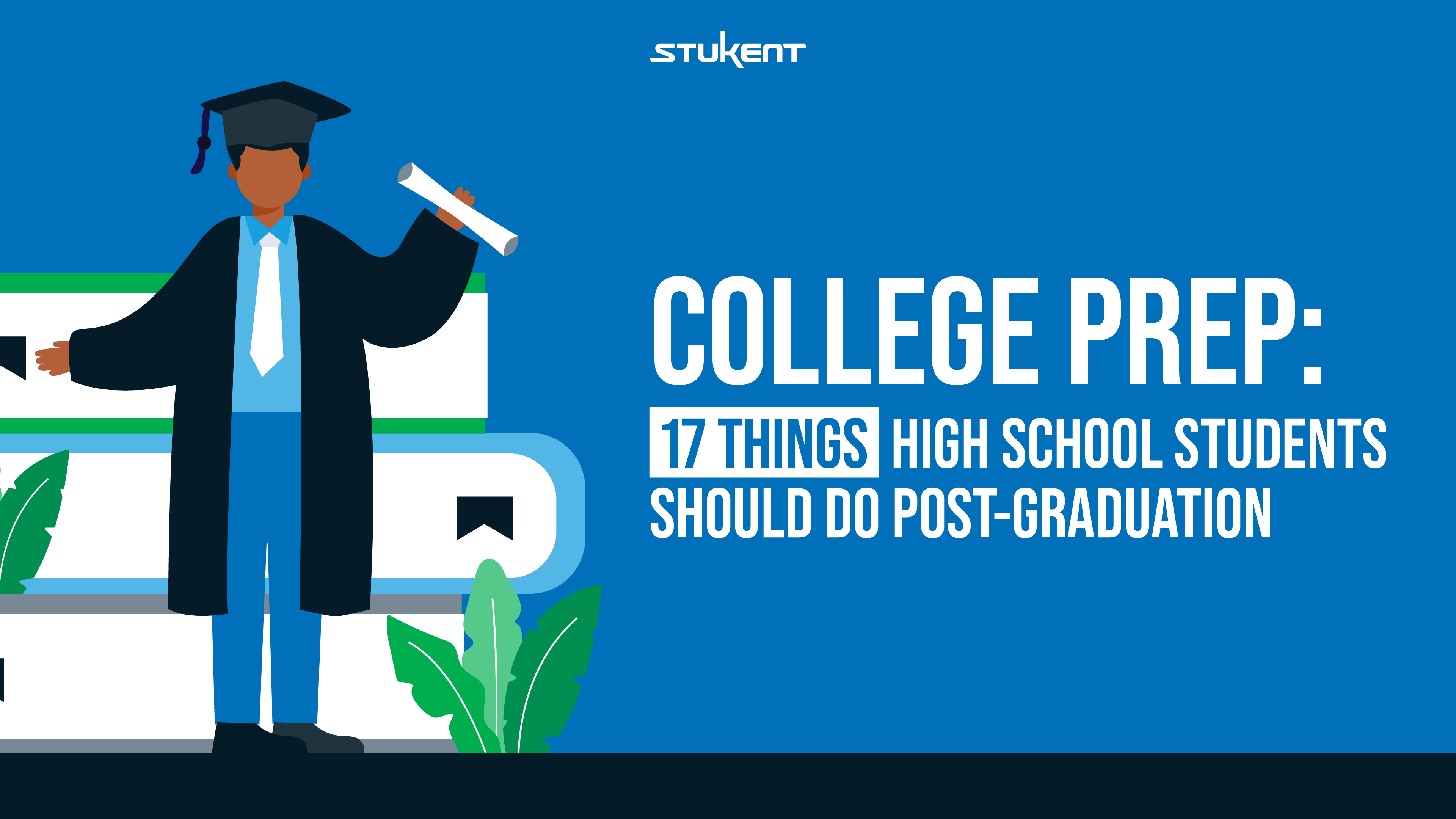What are things that a recent high school graduate should do before starting college in the fall to set them up for a successful first year?
To help high school students kick-start their college/career experience, Stukent asked CEOs, career coaches, and business leaders for their best tips. From establishing relationships in advance to stepping out of your comfort zone for unique experiences, there are several ways you can start preparing for your future.
Here are 17 pieces of advice for high school students!
- Start Networking Now
- Reflect on Your Strengths and Weaknesses
- Understand the Basics of Money and Credit
- Visit Your College Campus
- Build Your Dorm Room Early
- Review College Reading Lists
- Plan Ahead and Buy Your Books Early
- Gain College Experience Through a Summer Program
- Receive Guidance Through a Mentorship
- Master Time Management
- Spend the Summer Shadowing
- Practice Public Speaking
- Take a Tech Course
- Pick a Major With a Promising Career Path
- Consider Long-term Financial Requirements
- Emotionally Prepare for College
- Travel While You Can
1. Start Networking Now
Heading to college without a community can be a lonely experience. To prepare, start building your community in the summer. Connect with teachers and other students in your major and begin establishing relationships with them. You should also attend your orientation program to check for potential social opportunities.
If you plan to live in the campus dorms, reach out to your roommate and start building your relationship. Establishing relationships before your first year of college can help you transition to college life more smoothly. These connections are crucial to your educational success as they help you get into a routine, form study groups, and fulfill your need for socialization.
Brandon Brown, CEO, GRIN
2. Reflect on Your Strengths and Weaknesses
One thing that a recent high school graduate should do before starting college is to take the time to reflect on their strengths and weaknesses. This can help you determine what areas you should focus on while in college, such as improving your writing skills or taking a course in a subject that you are interested in but have not explored yet.
Matthew Ramirez, CEO, Paraphrase Tool
3. Understand the Basics of Money and Credit
The first year of college is typically one of the first times students will have more control and independence over their finances.
As a recent high school graduate, you should get your finances in order, set a financial plan or budget for the school year, and at least understand the basics of money and credit before entering college.
Some students may even consider applying for a credit card to build their credit, and some should start looking into work-study or part-time jobs that allow them to earn a bit of money on the side while studying.
Adam Shlomi, Founder, SoFlo Tutors
4. Visit Your College Campus
You can find out a lot online about the campus to help you prepare for what it will be like to take classes and/or live there. This helps you acclimate to the college lifestyle because it varies from high school.
There are often resources for freshmen designed to help you get to know more about the school and what is available on campus. By getting to know the campus, you won’t feel as overwhelmed on your first days because you already know where things are located.
You should look for activities to enjoy on campus outside of class and figure out where your classes will be held.
Mark Pierce, CEO, Cloud Peak Law Group
5. Build Your Dorm Room Early
It’s difficult to establish a comfortable living space when you’re not likely to have many household items that can come with you from home. Rather than panicking about the enormous expense of towels, a laundry basket, furniture, storage, and more, start building a stockpile of items 12 months before you go.
Ask your family if they have any items to spare, then head to secondhand and discount stores to find everything you need. Since stock in these stores isn’t reliable, giving yourself a bigger time window can help ensure you’re not stuck on moving day and paying higher prices to fill the gaps. Look at your school’s allowances before you buy anything, as many dorms prohibit certain items like candles or electric blankets.
Anthony Martin, Founder and CEO, Choice Mutual
6. Review College Reading Lists
Most colleges publish reading lists on their websites a few weeks before classes begin.
I highly suggest going through these lists, as they will give you an idea of the topics you’ll be learning about and what your workload will look like. This head start allows you to build confidence before starting your first year in college.
You don’t have to sit down for hours reviewing these reading lists. Five to 10 minutes per day is just fine.
Scott Lieberman, Owner, Touchdown Money
7. Plan Ahead and Buy Your Books Early
Recent high school graduates should start early and purchase their books during the break before classes begin. By ordering your books ahead of time, you can avoid the first week’s bookshop frenzy.
Look for less expensive offers online or consider renting books as a less expensive option. Don’t be the person who arrives late and is embarrassed, as teachers frequently expect students to have all their course materials on the first day of class. Also, getting your books early provides you with plenty of time to figure out what exactly these classes will cover.
Although completing these seven tasks will give you a head start, you should also enjoy the most of your summer vacation while you still have it.
Enjoy your favorite features of your hometown while you still can, as you’ll soon be leaving and living on your own. Also, make the most of your remaining time with loved ones.
Joe Li, Managing Director, CheckYa
8. Gain College Experience Through a Summer Program
A summer program could be university-led or independent, but either will be beneficial for allowing incoming freshmen to get used to college-level work and living independently.
Summer programs also offer chances for you to make connections with upperclassmen who may help you navigate college life and your first year. Attending a summer program can give you the competitive edge you need to start your collegiate career on the right foot.
Kate Duske, Editor in Chief, Escape Room Data
9. Receive Guidance Through a Mentorship
Your high school diploma results from 12+ years of hard work. You should be ready to start your new journey in a new place! Well, college is a different place than high school. You need more guidance because you have more freedom in college. For a successful first year, find a mentor. Find someone whom you can admire and look up to as an example. In college, life is not as you see in movies; you need guidance or a coach to help you find the right path.
Whether you are participating in cocurricular or extracurricular activities or trying to learn something new, a mentor has the experience to guide you on the best path. Find someone who is ahead of you on the journey, such as your senior or teacher, so you can look up to them in pursuit of a wonderful career.
You can ask your mentor for advice on anything, whether it be partnering, participating, making decisions, looking forward to a career, or other things. This way, you can make your journey through the first year effortless.
Saikat Ghosh, Associate Director of HR and Business, Technource
10. Master Time Management
One unique step a recent high school graduate should take before starting college is to establish a system for time management and organization. Experiment with various tools and methods such as digital calendars, productivity apps, or traditional planners, and determine which works best for your needs.
By developing these habits before college, you can more effectively balance your academics, extracurricular activities, and social life. Mastering time management early on sets the foundation for a successful first year and future college endeavors.
Dilruba Erkan, Consultant, Morse Decoder
11. Spend the Summer Shadowing
Everyone asks, “So what will you do after high school?” It’s such a loaded question. How can you decide what you will pursue when you have no life experience to inform your decision? Good news — you don’t have to wait years! We all have some kind of interest — why not engage in that interest now?
If you think you want to pursue law, there are many law firms that would love to have a motivated student volunteer to file paperwork, etc. While you’re volunteering, you’re seeing what lawyers really do — it’s not all in a courtroom. Think of how you can get real-world exposure to your interests right now. If you think you want to teach, you can help in summer school; if you think you want to be a chef, see if you can get a position in a kitchen — even if it’s a dishwasher — to see what the chefs are doing. Take advantage of the summer to explore your interests now. Make the dream come alive; it’s best that you don’t wait until college!
Elisha Peterson MD MEd FAAP FASA, Anesthesiologist and Pain Medicine Physician, Elisha Peterson MD PLLC
12. Practice Public Speaking
Practice public speaking to prepare yourself for college. Effective communication skills allow you to actively participate in class discussions, give presentations, and communicate with your professors. This also makes you a more confident and articulate speaker, which improves your performance in class and enhances your ability to share ideas and opinions.
Before classes start, you can attend public speaking workshops to learn how to structure and deliver effective speeches. Through this, you can showcase your potential and overcome anxiety when speaking to others. Not only will this make you a confident speaker, but it will also build your leadership skills and enable you to gain your colleagues’ trust, especially in group settings.
Riva Jeane May Caburog, PR and Media Coordinator, Nadrich & Cohen Accident Injury Lawyers
13. Take a Tech Course
As a college graduate in journalism, one piece of advice I would give to a recent high school graduate heading off to college in the fall is to seek opportunities to become comfortable with technology, even if it’s not within the field they intend to major in. In today’s digital world, having basic knowledge of computer programs, coding, and design is invaluable for any college student.
The college will provide plenty of unique technical opportunities, but arriving on campus prepared can set you up for success from the get-go. No matter your degree program or career path, having a firm foundation in tech basics can give you an edge in finding internships and jobs post-graduation.
Nadzeya Sankovich, Senior Journalist, Health Reporter
14. Pick a Major With a Promising Career Path
Identifying a major with promising career opportunities will allow you to have a goal in sight and will provide motivation. Research the job outlook for potential majors, and make sure that you are following a career path that has excellent prospects for growth. You can reach out to those who have gone through similar majors and ask for advice. This will help ensure that you are making the right decision.
Gabriel Bogner, Cofounder, Mate Fertility
15. Consider Long-term Financial Requirements
I’m American, but I’ve been living in Germany for seven years. I studied solely in America and, unfortunately, still have quite a load of student debt — something typical for Americans. Until I moved to Germany, I didn’t realize how many options there were for a high-quality education at a much cheaper price.
In Germany, studying is basically free, and in many EU countries, it still costs very little in comparison with the U.S. Had I known this existed, I could’ve saved SOOO much money and even had a unique cultural experience studying in another country. Don’t limit your options to one country and one university.
Seriously consider and research how the costs of studying will affect your long-term finances. Because when the time comes that you want to do things like buy a house, start a family, or invest in a pension, the financial decisions you made when you studied will heavily impact that.
Adriana Stein, CEO and Founder, AS Marketing
16. Emotionally Prepare for College
Before college, recent high school graduates should make sure they emotionally prepare themselves to transition into the next chapter of their life. One way of doing this is to create an action plan for yourself that lists goals you wish to accomplish in the first year.
Exploring these objectives can help ease any anxiety around taking on new challenges. Decide what you want out of the year, both academically and personally, because it will provide structure when juggling classes and extracurriculars come fall. With clear expectations laid out long before day one, school is achievable and enjoyable for all students.
Julia Kelly, Managing Partner, Rigits
17. Travel While You Can
Apart from the obvious of organizing finances and choosing courses, something that I would highly recommend to any recent high school graduate before starting college in the fall is to take a break and travel. There’s no better way to step out of your comfort zone and gain unique experiences than by exploring various parts of the world or even just parts of your own country that you have never seen before.
By taking the time to acquaint yourself with new cultures, unfamiliar places, and new perspectives, you can prepare yourself for universities that provide ample opportunities for students to learn about different countries through study-abroad programs. It also serves as a great opportunity for personal growth and a chance to reflect on where you want your academic path to take you.
Joe Troyer, CEO and Growth Advisor, Digital Triggers
Takeaway
Preparing for college and future careers can be a daunting task, but it can be made easier with the help of Stukent’s Career Readiness Simulation. All of Stukent’s Simternships™ and simulations are designed to prepare students for real-world scenarios, allowing them to practice their skills and build their confidence to succeed in college and beyond.
To learn more about all of Stukent’s products for education, visit our website.






